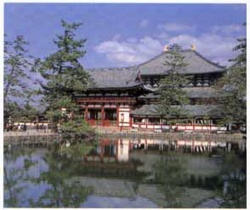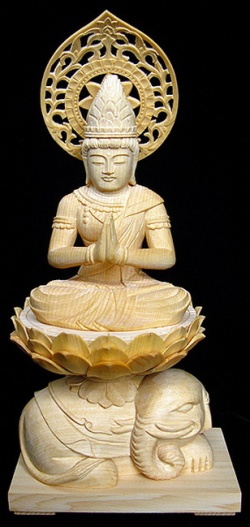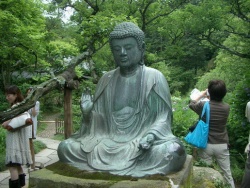The Falling Away of Self
<poem>
The concept of self/true self is a very important issue in Buddhism. The Lord Buddha offered insight into these concepts in many sutra including the Diamond Sutra, Heart Sutra and Lankavatara Sutra. The Buddha teaches two concepts of "self" one is the corporal self and the other is the True or "Absolute Self" (aka Buddha Nature).
The cycle of understanding the Buddha's teaching in regard to the self is a three-fold process. This process starts out with duality by offering the two poles of self and True Self. These points illuminate one another and are necessary to advance to the higher teachings that come later. The first end of the pole is the corporal self. This "little self" is a mental process and projection of the ego. The little self is the minds perception of our form. The Buddha uses this point of reference to illuminate the relative philosophy of Buddhism. For example comments such as "look to the self" are used in a relative sense to give the student a focal point.
The buddha taught us to look within ourselves for truth and not rely on gods or others to "enlighten" us. Moreover, the Buddha calls for us to care for "ourselves" both physically and mentally. This call to care for the "self" more than likely stems from his ascetic practice and his realization of the middle path. The middle path offered an escape from the dualistic extremes of life. This was illuminated one day after fasting for weeks; the Buddha had knelt into a river to drink and was too weak to rise. Laying there on his side he grabbed onto an overhanging branch as he pulled himself to the bank. At this time the duality of extremes manifested in his consciousness and the Buddha realized extremes were not correct path.
So the "self" needs to be fed, watered and respected in order for it to carry us through our practice. We don't need to abuse our mind and body in order to realize the highest truth. Zen is not about punishing your "self" in order to transcend it. It was not until after Buddha regained his strength both physically and mentally that he sit under the Bodhi Tree and realized anuttara samyak sambodhi.
This brings to mind a zen story: Once a Zen Student had confronted his teacher with the question "Is pain real"? The Zen Teacher told the monk to place his hand on the table - which the monk did. The teacher took a rock and struck the monks hand and said "Does this hurt?" So if we look at this story we find the little self to be very real and the monk was in great pain I am sure. The mind makes it real as it is trying to protect the body or mind by creating a noxious emotional reaction. So in our practice we must find our "middle path" and be true to it - Zen is not a competition on who can overcome the most pain! The only practice that matters is yours and as long as you are pure of heart and mind; you yourself become the Buddha in your search.
The other pole of this dualistic equation is the "True Self". The true self is also called the "Buddha Nature". In "True Self" we find this concept has transcended the relative "little self" meaning and illuminated something much different. The "true self" is really no self at all in the common meaning. The true self burns through conceptual understandings and relative words. True self is not the ego projection of perceived form, it is the true nature of all things. The comment we find in Hakuin's Song Of Zazen -"...True self is no self" , tries to convey the higher sense of the meaning still using relative concepts. As we see, self in this sense is a ghost in the machine and falls away when probed deeply! In contrast true self "buddha Nature" is the essence of all that "is". When we use the idea of "true self" we must try not to conceptualize it or it becomes little self once again.
The Buddha Nature is vast and wide and just as the Tao can not be Taoed; the Buddha Nature be confined by our "ideas" because the Buddha Nature is no nature at all. This true Self goes beyond the parameters of separation and individualization. It unifies without creating marks to confine it. In zazen we realize this true self and experience it when samadhi is deep and we have exhausted our grasping and rationalization. It is our "true face" and is far beyond the skandhas.
The experience of "True Self" should be direct and without attachment or intentions of pursuit. It is fleeting when ego arises to entangle it in samsara. It is like to trying to hold a fist full of water - the harder you clinch your fist the faster the water falls away. The Buddha taught that "true self"(although a higher teaching than "little self") is still not the highest teaching. The highest teaching expounded by the Buddha was Anuttara Samyak Sambodhi which will talk about next.
The words Anuttara Samyak Sambodhi mean "Perfect enlightenment" and these words are a marker the Buddha used to describe his highest realization. These words point beyond concepts such as self and True Self and this is demonstrated by the verse: "In them (bodhisattva), however, no perception of a self will take place, or of a being, a soul, or a person. And why? That, O Lord, which is perception of self, that is indeed no perception. That which is perception of a being, a soul or a person, that is indeed no perception. And why? Because the Buddhas, the Lords have left all perceptions behind - Diamond Sutra".
These relative dualistic markers of self and true self have been used and beached on the other shore. The awakening has occurred and one sees beyond even Buddhism itself. The dharmakaya is now realized and all the perception of self (self-no self-true self) have fallen away. The bodhichitta has matured and become vast and enveloping of all concepts and surpassing them boundlessly. There just is Buddha Nature without anything missing.
The direct experience is like a snake shedding it's old dead skin and emerging with his new body - the Body Of Buddha! This experience is also called kensho or satori, which echoes in the personal accounts of other Buddhists' since the time of the Buddha. Dogen was very clear without entangling his experience by saying "It is, without anything missing". The more we try to define "it" the further we wedge perception between ourselves and "It is - without anything missing"!
The Illusion of a Permanent Self or Soul The Buddha taught that there is no essential or permanent core to a living being that could be considered one's true self or soul. What appears to be an individual person is actually a changing process of mental and physical qualities combining temporarily in a particular way. Through possessive attachment, the mind identifies with part or all of this process, and this gives rise to the thought of 'me' and 'mine'. In fact, all phenomena, animate or inanimate, are dependently arisen from causes and conditions. In a constant state of flux, all things are empty of independent inherent existence and the entirety of reality is a continuous flow of interconnected, causally conditioned events arising and passing away in the present moment.
Rebirth however, still occurs without a soul. Consider the simile of a candle burning low and about to go out. A new candle is then lit from the old one. Though the old candle goes out, the new candle now burns brightly. What went across from the old candle to the new? There was a causal link, but no 'thing' went across. Similarly, there was a causal link between one's past and present life, but no soul went across.
The Buddha taught that it is precisely this deep misunderstanding, the illusion of a self, that is the root cause of all human suffering. The illusion of self manifests as the ego, and the natural unstoppable function of the ego is to control. Big egos want to control the world, average egos attempt to control their immediate surroundings of home, family and workplace, and all egos strive to control what they assume to be their own bodies and minds. This attempt to control leads to attraction and aversion which consequently proliferates to acquire possessions, manipulate others and exploit the environment.
Although the sense of self seeks its own happiness, its insatiable craving repeatedly produces discontent. As long as one identifies with something as oneself, the inevitable result is the lack of outer harmony and inner fulfillment. Only through sharp insight based on profound meditation can this mirage be clearly seen for what it truly is, Only then can one know perfect happiness. <poem>


